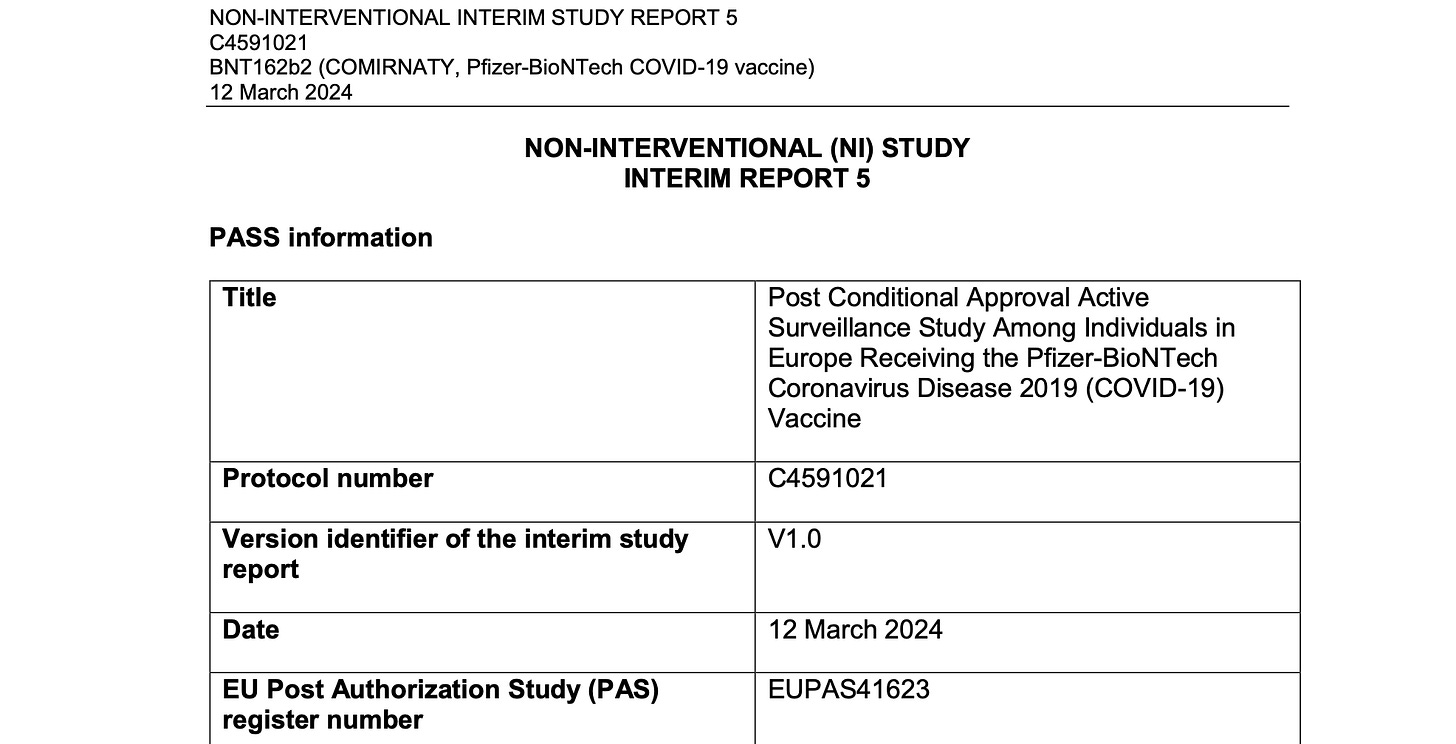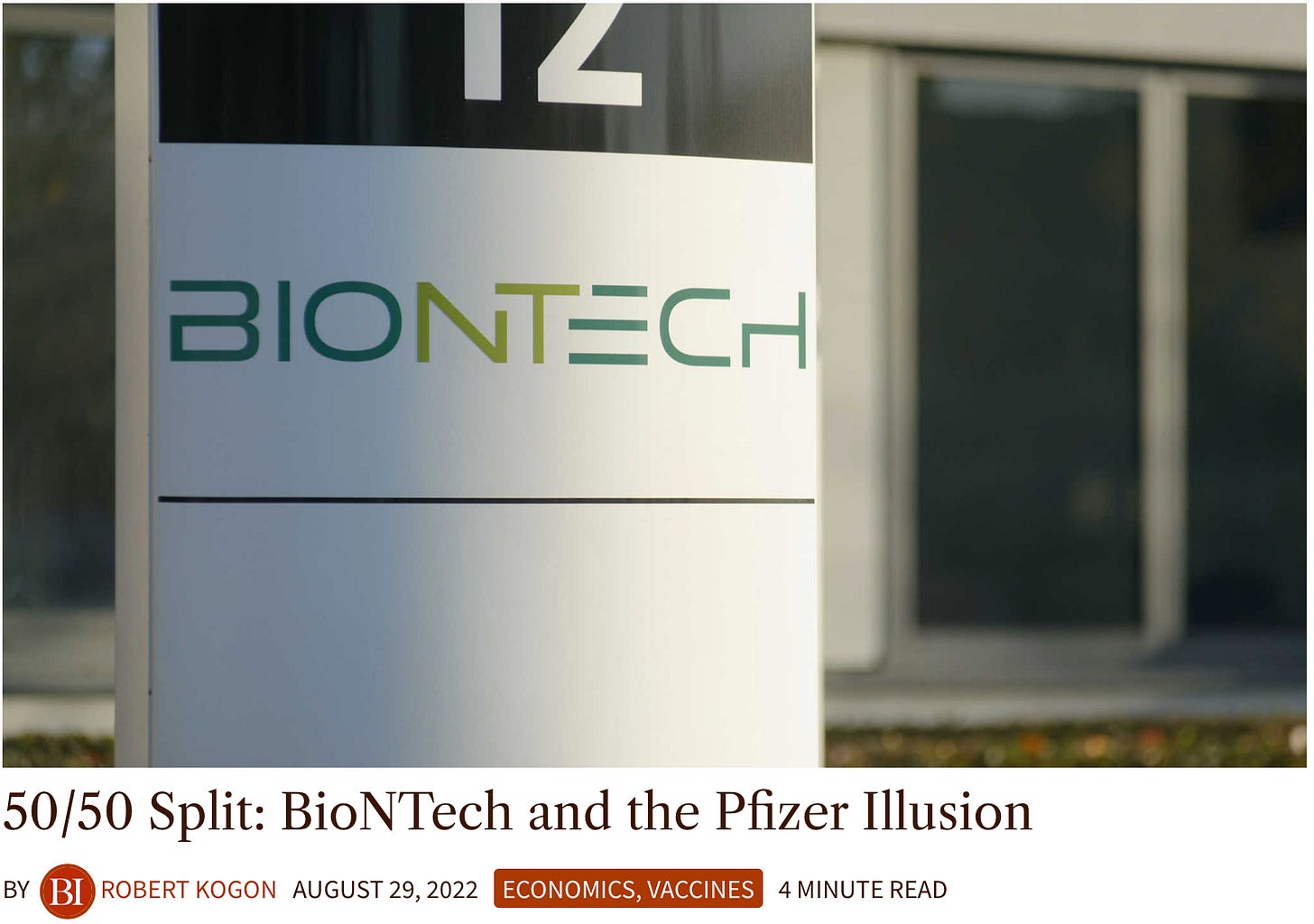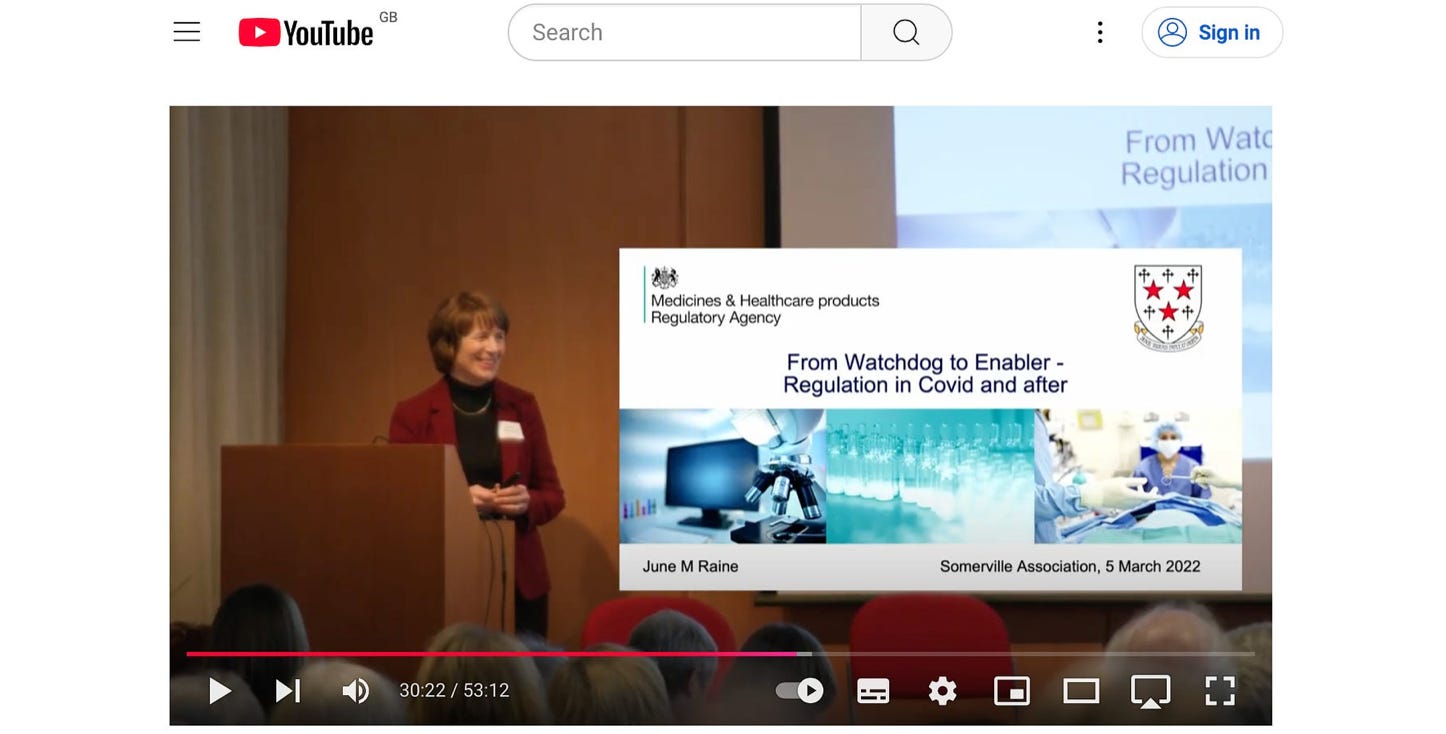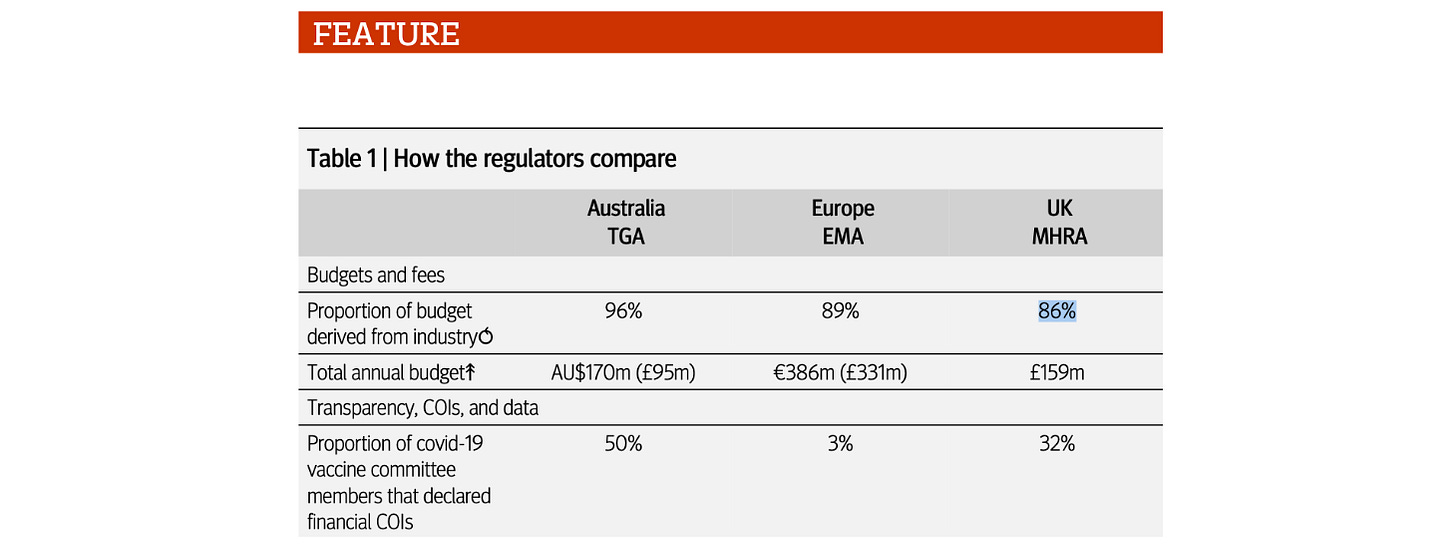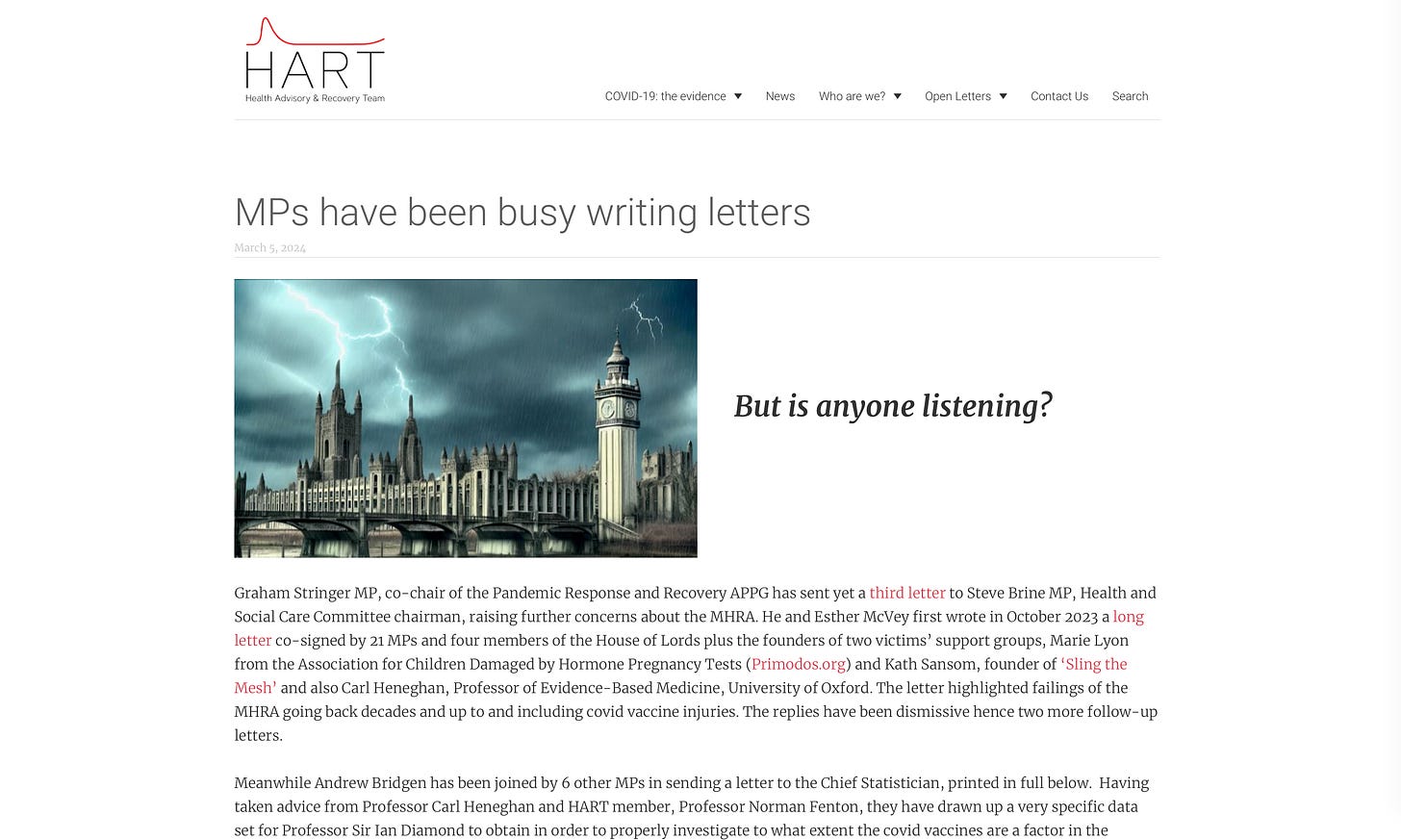MHRA - or HARM?
A shocking Pfizer report; the MHRA: from watchdog to enabler; attempts to address the problems; where to go from here?
Dear Church Leaders (and everyone else)
Further to this post…
And the recent revelations re what was going on at UK government meetings in 2020 and 2021…
This post relates primarily to the UK regulator, usually known as the MHRA rather than the 15-syllable Medicines and Healthcare products Regulations Agency.
It begins with a shocking Pfizer report that — perhaps even more shockingly — the MHRA are keeping quiet about.
A shocking Pfizer report
The report itself
The report was uncovered by Nick Hunt, a former Senior Civil Servant in the Ministry of Defence responsible for the safety and effectiveness of ammunition used by the Armed Forces. Details can be found here:
Among other things, that article summarises this Pfizer report:
And adds to this previous piece from October, which opens with these words:
For six months, the MHRA and other national regulators have been sitting on a Pfizer report about Covid vaccine safety. Worryingly, the abstract which I have just found online doesn’t look good at all:
the vaccinated cohort have at least 23-40% higher risk of some heart-related conditions; and
the risk is higher than in Pfizer’s previous report (i.e., it is increasing over time since vaccination).
The report in question is Pfizer’s report C4591021 ‘Interim Report 5’ dated March 12th 2024. It is a Post Authorisation Safety Study (PASS) of Pfizer’s Covid vaccine…
The recent article begins:
I told you here about Pfizer’s abstract of its Interim Report 5, showing at least 23-40% higher risk of some heart-related conditions in the vaccinated, but that the MHRA, the U.K. medicines regulator, was withholding publication of the full report. As I said at the time : “In summary, if, as I suspect, MHRA is worried by the results in Pfizer’s ‘Interim Report 5’ then no wonder it is sitting on it.”
Well, MHRA is still sitting on the report but I’ve managed to obtain a copy. It looks like I was right – the detailed results in the full report are even more worrying than the Hazard Ratios in the abstract which I reported last time (below).
In other words, compared to the unvaccinated, vaccinated individuals face:
23% higher risk of acute cardiovascular injury, with the gap worsening over time
27% higher risk of arrhythmia
2% higher risk of heart failure, though this is not yet statistically significant
30% higher risk of stress cardiomyopathy
40% higher risk of coronary artery disease, with risks increasing over time
130% higher risk of myocarditis1 — inflammation of the heart muscle — within 21 days
And over time, this is getting worse.
Airline safety concerns
The author, with his Ministry of Defence background, describes how:
I wrote to the Civil Aviation Authority (CAA) about this in October, sending it a copy of Pfizer’s abstract of its report.
He says that:
CAA’s reply was a tragic comedy. It thought that Pfizer’s report was describing 37 events in 12 million people so it was completely dismissive. Apparently, at that rate, “if all UK-licensed commercial pilots received the vaccine, we would expect fewer than one to have experienced significant adverse effects”.
And points out that:
Sadly for the CAA, Pfizer’s report is actually describing 37 different types of events (and thousands of them) and the relative incidence for each type of event between 12 million vaccinated people and 12 million unvaccinated people matched for things like age and sex.
He has since replied to the CAA, pointing out that:
Pfizer’s abstract of its Interim Report 5 (March 2024) shows a higher incidence of heart problems in the Covid vaccinated population.
CAA’s aeromedical regime for pilot licensing is based on the rate of sudden incapacitation in the general population.
CAA’s aeromedical regime was never 100% effective – there was always residual risk of a pilot passing the medical with a subclinical heart problem which later manifests during flight. It calls this residual risk the “1% rule”.
Pfizer’s report means that the rate of sudden incapacitation in the general population has increased, so proportionately more pilots will pass medicals with subclinical heart problems which, in turn, increases the risk of sudden pilot incapacitation in flight.
It is axiomatic that CAA needs to adjust the periodicity and depth of its aeromedicals.
But, as of 11th December, he still awaits a further reply from the CAA.
Parliamentary questions
He adds that MP Esther McVey has asked a couple of Parliamentary Questions about Pfizer’s report of increased heart problems in the Covid vaccinated:
The first asked if MHRA had consulted other industry safety regulators about Pfizer’s report. The answer was no. It seems to me that there is clash of safety cultures: MHRA think safety is relative (“safe equals benefits greater than risk”) so it probably didn’t even occur to its officials to consult other industry safety regulators who actually deal in absolute risks.
The second question asked the Department for Transport [DfT] what implications Pfizer’s report had for CAA’s aeromedical regime. DfT denied that it had any implications at all. It seems to me that DfT/CAA is ignoring the obvious.
And summarises that:
We’ve got MHRA not consulting other industry safety regulators about the obvious wider safety implications of Pfizer’s report of increased heart problems in the Covid vaccinated, and CAA unable to read Pfizer’s report properly or being in denial.
The bigger picture
As noted here in God over government? (part 1), the so-called “Pfizer vaccine” is in fact owned by the German company BioNTech which earns far more from global sales of the vaccine than Pfizer:
So why was Pfizer was gathering such data? According to the pseudonymous but well-informed Robert Kogon:
It was doing so because it had an agreement to conduct pharmacovigilance on behalf of another company…
Kogon finds it curious that the Pfizer study found:
…no increased risk of Bell’s Palsy among vaccinees.
And asks:
Do you find that plausible? The companies themselves acknowledge such risk.
He reckons that:
There’s something odd about this study and I would assume it is also lowballing the cardiac risk.
But in any case, it is not so much Pfizer keeping the data from the public. It is the regulator — the MHRA — keeping quiet about the report even as people continue to take covid “boosters” while oblivious to the risks. And on that basis alone, HARM would seem like a more appropriate set of initials.
Meanwhile…
UK mainstream media journalists will apparently not report on the findings.
Most politicians will not raise concerns.
And most doctors are keeping quiet, perhaps fearful that if they raise the subject of a Pfizer report, it might be considered a “‘scaremongering’ Covid vaccine conspiracy theory”?
The MHRA: from watchdog to enabler
More broadly re the MHRA, I am reminded of June Raine, its Chief Executive Officer, giving this speech at Oxford University’s Somerville College in 2022:
Transcript from 30:20 (emphasis added):
…It’s a tremendous honour to be speaking. How to follow Kate [Kate Bingham, Chair of the UK government’s Vaccine Taskforce in 2020]… because I wouldn’t be here if it wasn’t for Kate and the absolutely incredible job she did… the prescient selection of those vaccines which is why I’m here, and probably why most of the people in this room are here…
My purpose really is to take Kate’s story a little bit further and tell you how the covid pandemic has catalysed the transformation of a regulator from a watchdog to enabler… [as shown on the slide pictured above]
The story of this transformation is effectively the tale of two cities, from London to Oxford…
…I was dashing into Number 10… for a meeting in the cabinet office about covid tests… The question arose [as to] why a regulator was in the room. Was a regulator going to be able to do anything about this?
And our PM [Boris Johnson], who seems to be able to notice things, shot a comment to me: “Well, the MHRA will stop us killing people.”
And for some reason I immediately was able to respond: “No, the MHRA will help you keep people alive.” And that is the signal of the watchdog to the enabler.
It is important to bear in mind that, according to this 2022 British Medical Journal investigation…
86% of the MHRA budget is derived from industry — the industry that the MHRA is supposed to be regulating:
And that it is in that context that the MHRA is being transformed — in the words of its CEO — from a watchdog to an enabler.
Attempts to address the problems
The Perseus Report
The failings of the MHRA in relation to the so-called covid vaccines were detailed in the Perseus report, published in April 2023:
A summary of the main report can be found here, and it is reproduced in this footnote.2
The authors say that:
This report, published in April 2023, was intended to widen visibility of MHRA’s regulatory failures to Parliamentarians, the media and the public.
We sent a copy to all MPs & Peers…
And in April 2024, in the context of the Perseus Report, this open letter — signed by many doctors, among others — was sent to Steve Barclay MP, who was Health Secretary at the time:
An sizeable iceberg of failure
In February, this letter, raising more general concerns about the MHRA, and signed by 25 Parliamentarians, was sent to Steve Brine MP, the Chair of the Health and Social Care Select Committee:
The evidence leads us to believe that serious patient safety concerns persist... We also believe that the MHRA is at the heart of these far wider endemic failings, and that those cited in this letter merely represent the tip of a sizeable iceberg of failure.
MPs have written other letters too:
But apparently to little avail.
A recent attempt to thwart a Parliamentary debate on the performance of the MHRA?
As to Parliamentary debate on the performance of the MHRA, it is worth noting what happened on 12th December:
As I understand it, the debate didn’t happen.
Does anyone still think that the regulators and our government are actually working for the benefit of the population at large?
Where to go from here?
Ideas for reform of the MHRA
The MHRA clearly needs major reform — to say the least.
According to pathologist Dr Clare Craig,3 who is more perceptive than most about the role of medical regulators, at least part of the problem is:
The regulator is asked to “approve” drugs.
Once that happens — even under temporary or emergency use status — the regulator owns that decision.
From then on they are on the defensive.
Safety can no longer be a priority under those circumstances.
Her view is that:
We need regulators who are concerned ONLY with safety.
Decisions to give a medicine should always be on an individual basis between doctor and patient and with full information.
The regulator should provide full information on safety only.
And that:
Information on benefit should come from a different independent body.
In the UK, it would make sense for this to be NICE as they already do cost-benefit analysis so have the sums to give a “number needed to treat” for different circumstances.
And:
Doctors and patients should then be given freedom to weigh up the number needed to treat for one success against the number needed to harm to decide what is the best course of action.
Giving the example:
Why should a regulator ban a drug that can cause appendicitis when the patient that might benefit from it may have already had an appendicectomy.
Plus, even quite toxic drugs can have a role to play in life threatening situations.
And emphasising that:
What is key is that choice must rest with the patient.
Information must be provided by the regulator.
Conflicts within the regulator because of approvals must end.
It sounds sensible to me.
Parliamentary petitions
At least in principle, one way of bring the issues to the attention of our elected representatives is via UK Government and Parliament petitions.
This petition had over 13,000 signatures but was closed early because of the July General Election:
The response of the Sunak government was not promising:
Patient safety is the MHRA’s highest priority. There are no plans to review the MHRA, including its accountability, approval processes or its monitoring of the safety of products.
A new petition, started in early December — and with a six-month deadline of 6 June 2025 — had attracted 1,568 signatures at the time of writing:
But even if the petition reaches the 10,000 mark, it would be surprising if the Starmer government’s response differed substantially from the Sunak government’s. And in any case, it seems evident from the previous section that the-powers-that-be are less than keen on a Parliamentary debate on the performance of the MHRA.
It is hard to see much prospect of progress until the extent of the harms done over the past few years are much more widely known. It doesn’t help that so many people have a vested interest in “moving on” from what has happened. But the truth is slowly but surely becoming more widely known.
Related:
Dear Church Leaders most-read articles
Some posts, including a version of this one, can also be found on Unexpected Turns
The Big Reveal: Christianity carefully considered as the solution to a problem
According to this paper, “Myocarditis is an inflammatory disease of the myocardium caused by infectious or non-infectious agents. It can lead to serious short-term and long-term sequalae, such as sudden cardiac death or dilated cardiomyopathy. Due to its heterogenous clinical presentation and disease course, challenging diagnosis and limited evidence for prognostic stratification, myocarditis poses a great challenge to clinicians.”






